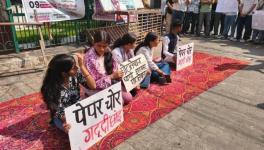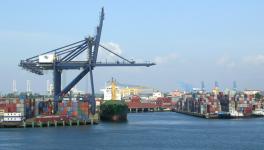Push Towards Privatisation, Shortage of Staff – the Poor State of Indian Railways
Indian Railways have been running some goods trains without guards during night hours, said Rail Minister Ashwini Vaishnaw while answering a question in the Lok Sabha earlier this month. While the minister claimed that this is not a safety concern, he also acknowledged a large shortage of guards. It is not just guards; Indian Railways has a huge staff shortage for all posts.
According to data presented in the Lok Sabha on Wednesday, March 30, as on February 1, 2022, 3,03,933 posts were lying vacant. Out of these, 2,519 are gazetted posts, and 3,01,414 are non-gazetted posts. Currently, the recruitment process is ongoing for 1,40,713 of these posts. While the minister insisted that the ministry is keen on filling up the vacant posts, a look at the data presented in the annual reports of the Indian Railways reveals a different picture.
The data reveals that between 2019-20 and 2020-21, the number of personnel employed by the Railways decreased, while there should have been recruitments to fill the vacant posts. The number of staff employed by the ministry decreased from 12,35,900 to 12,33,700. And this shortage is clearly not caused by a lack of eligible people. During 2020-21, 4.4 lakh candidates had given exams for 1,923 vacancies in the Ministerial and Isolated Categories, while 1.26 crore candidates had given the exam for 35,281 vacancies in the Non-Technical Popular Categories. While the annual report for 2020-21 has a large section dedicated to 'Promoting Hindi', it mentions nothing about the shortage of staff and the difficulties caused by it.
When asked about the future plans of the ministry, the minister laid out the key details of the National Rail Plan (NRP) for India - 2030. However, these did not include filling up vacant posts through faster recruitments. Instead, it highlighted the importance of the private sector's sustained involvement in areas like operations and ownership of rolling stock, development of freight and passenger terminals, development/operations of track infrastructure, etc.
As on April 1, 2021, Indian Railways has taken up 187 new line projects of 21,037 km length, costing approx Rs 4.06 lakh crore, which are in various stages of planning/approval/execution, out of which commissioning of 2,621 km length has been achieved and expenditure of approx. 1.06 lakh crore has been incurred up to March 2021. These new projects were undertaken while the ministry already had hundreds of pending projects at various stages of completion. As of April 1, 2021, 484 railway projects (187 new lines, 46 gauge conversion and 251 doublings) of 51,165 km length, costing approximately Rs 7.53 lakh crore, were in different stages of planning, sanction, and execution, out of which 10,638 km length had been commissioned.
For Railway Infrastructure projects such as the construction of new lines, gauge conversion and multi-tracking works, acquisition of land, including private land, is done by the Railways through concerned state governments. When asked whether the Railways has provided employment to people whose land had been acquired to execute various projects, the minister said, "Railways have provided appointment to land losers as per Ministry of Railways' extant instructions subject to availability of vacancies and fulfilment of eligibility criteria. However, vide Ministry of Railways' letter dated 11.11.2019, policy of giving jobs to land losers has been withdrawn."
He added that now only a lump-sum payment of Rs 5 lakhs is to be provided to affected families who are primarily dependent on acquired land for livelihood, that is, cases where their livelihood is affected by such acquisition or where the entire landholding of the affected family have been acquired.
When asked about how the Government is planning to utilise and elevate the infrastructure of Railways under the National Infrastructure Pipeline, the minister kept his answer brief. He said, "The Government of India had set up a Task Force to draw up the National Infrastructure Pipeline (NIP) for the period up to Financial Year (FY) 2025. The Terms of Reference of the Task Force were to identify technically feasible and financially/economically viable infrastructure projects that can be initiated in the period FY 2019-20 to FY 2024-25; to estimate annual infrastructure investments/capital costs, and to provide visibility of such projects to the prospective investors, both domestic and foreign."
He added, "Ministry of Railways also joined this initiative in respect of its major value infrastructure projects of Doubling, New Lines, Gauge Conversion, Wagon procurements etc., with a view to complete in a focused manner with a timely allocation of funds."
Get the latest reports & analysis with people's perspective on Protests, movements & deep analytical videos, discussions of the current affairs in your Telegram app. Subscribe to NewsClick's Telegram channel & get Real-Time updates on stories, as they get published on our website.
























